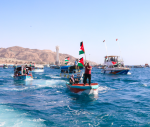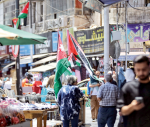You are here
A call to action: Upholding human dignity in a changing world
Feb 11,2025 - Last updated at Feb 11,2025
In an era of rapid technological, social and geopolitical change, the fundamental principle of human dignity has never been more vital. As the world confronts new challenges, from widening inequality to the erosion of democratic norms, compromised implementation of international law, the inherent worth and rights of every individual must remain at the forefront.
For decades, UN-affiliated NGOs such as the United Nations Relief and Works Agency for Palestine Refugees (UNRWA) and the United Nations High Commissioner for Refugees (UNHCR), alongside international bodies like the US Agency for International Development (USAID) and non-governmental organisations such as Mercy Corps, have played an unequivocally crucial role in delivering essential services—including education, healthcare and emergency relief assistance. UNRWA alone is responsible for the delivery of essential humanitarian services to 6.7 million Palestinian refugees in its five fields of operation across the region. Other international donors – each in their own capacity – provided much needed assistance and critical services to their targeted populations too, thus playing a stabilizing role in the host communities that they operate in.
Today, these organisations are finding themselves at the crossroads of increasing political scrutiny, misinformation/disinformation campaigns, funding cuts, and mounting regional instability. The recent decision to freeze aid and funding of some of these organisations is deeply alarming, leaving the future of humanitarian efforts uncertain.
A recent UN survey highlighted the far-reaching consequences of these funding reductions, warning of significant disruptions to major UN agencies such as the World Food Programme (WFP), the World Health Organization (WHO), and UNICEF. The results of this survey are indeed alarming, whether ethically or from a humanitarian and developmental perspective. The world through its members states at the UN General Assembly has committed to the 2030 Agenda and the full implementations of the 17 Sustainable Development Goals – above all, Goal 17, which emphasises partnership.
The United States, traditionally the largest single donor of aid globally, provided more than 40 per cent of the UN’s humanitarian aid budget last year. For instance, USAID has provided over $600 million in economic assistance to Palestinians in Gaza and the Occupied West Bank since 2021. The erosion of financial support for these vital institutions threatens to deepen the suffering of vulnerable populations worldwide. However, USAID itself has also come under growing scrutiny. As former USAID Administrator Samatha Powers recently emphasised, the politicization of aid poses a serious threat to long-standing diplomatic and humanitarian efforts, undermining the stability and effectiveness of global assistance programmes.
In a similar case, UNRWA’s mandate to provide education, healthcare, and emergency assistance to over 6.7 million Palestinian refugees today, underscore the vital importance of the Agency’s mission. A funding shortfall could leave over 700,000 Palestinian children without access to education and disrupt essential healthcare services for more than 3 million refugees who rely on UNRWA for primary care. The international community must recognise that UNRWA’s mandate is a lifeline, not a political tool, and its continued operation is a testament to the world’s dedication to upholding human dignity of the most vulnerable. Preserving the Agency’s ability to operate is an investment in regional and global stability, in peace, and in the future.
What these vital institutions face today undermines their ability to fulfill their core missions. The “weaponization of aid” and the erosion of international cooperation threaten to exacerbate the suffering of vulnerable populations, rather than resolving underlying political disputes. This is a new era where the ethics of war and peace are being revised.
In the 1980s, Jordan led the call for the implementation of a New International Humanitarian Order (N.I.H.O). 28 members, including the five permanent members of the Security Council joined the call, where they prioritised the safeguarding of dignity and right to life of every person and of the future generations.
The responsibility to defend human dignity does not rest solely with policymakers and international bodies. Educators, religious and community leaders, and engaged citizens all have a role to play. By fostering values of empathy and justice in future generations, leveraging moral authority, and mobilising collective action, we can work toward a world where humanitarian principles prevail over political divisions, and where core humanity is preserved at all times.
Safeguarding these vital institutions and the principles they embody is not just a moral imperative—it is a necessity for navigating the complexities of the 21st century with compassion, cooperation and a steadfast commitment to international law and human dignity.














Add new comment